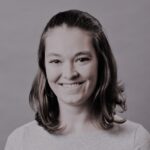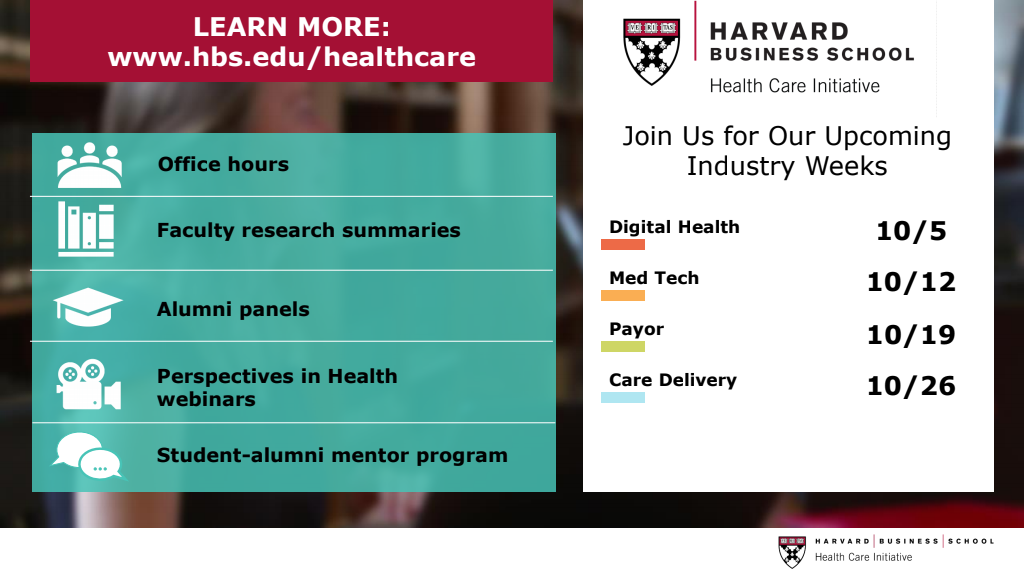
Rebecca Braun (MBA ’21) reports on the concerted efforts by the HBS Community to improve civic engagement and voter turnout in the upcoming presidential election.
U.S. voter participation is low by both international and historical standards, and the youth of today are less likely to vote than both the Boomers we mock and our peers of past decades. But many feel that we might be at an inflection point. In today’s fraught context—abounding with pandemic, recession, enduring racism, climate change, partisanship, and the death of a Supreme Court Justice—there is renewed interest in politics among the population generally and young people specifically.
This HBS cohort can set a new bar for civic engagement. Voting is step one. Our track record is not stellar: in the 2016 presidential elections, a measly 40% of eligible graduate students at Harvard voted, per a report from the National Study of Learning, Voting, and Engagement (NSLVE). Surely, we can do better.
HBS is not known for political activism, especially compared to our counterparts across the river, but HBS students are engaged in the elections this year. “Business school is an investment in our futures, at a huge opportunity cost,” Stephen Moch (MBA/MPP ’21) points out. “But to see that benefit, we need to have lasting institutions that can sustain job prospects—and life prospects. Now is the time to do something. We will reap the benefits for the rest of our lives.” If you are one of the many who want to do “something,” look to our HBS community for inspiration.
We can start with education, formal or informal. ECs are excited about a new course called “Road to the White House, a Businessperson’s Perspective on Presidential Politics.” It is taught by Robert White, who Chaired Mitt Romney’s 2008 and 2012 Presidential Campaigns and served as a full-time senior advisor on both. Asked what he hopes students learn, Professor White stated, “I hope that they leave the course more energized to actively engage in the important political debates that have a direct effect on our communities at a time when both capitalism and democracy itself are being challenged.” Reflecting on the classes thus far, Moch acknowledged the “mutual admiration and respect” visible across the political aisle between the teaching team and visiting speakers like Obama campaign strategist David Axelrod.
A common challenge is to turn learning into action. This has prompted Ariel Carmeli (MS/MBA ’22) to organize “Act Now” events. Inspired by the impactful small-group discussions on race organized by sectionmates Nimisha Ganesh, Nicole Granet, Alex Green, and Allie O’Shea (MBAs ’21), Carmeli hoped to provide a similar and nonpartisan forum about voting. He chose this topic “first because it’s my responsibility, but also because I want to support the cross-generational, cross-racial struggle for the ability to vote.” At one such gathering, Alec Forbes (MBA ’21) applied to be a poll worker—for which there is an unusually acute need because more Americans over 60, who comprised 58% of poll workers in 2018 per the Pew Research Center, are staying home to reduce their coronavirus risk. “I needed this nudge!” said Forbes. Anyone can follow this model, organizing small groups for discussion, action, and accountability.
Also educating and seeking tangible action, recent HBS graduate Chelsea Celistan (MBA ’20) and a team of co-founders started the community March to the Polls (M2P) after the death of George Floyd. Observing the marches following Floyd’s death, Celistan imagined, “How powerful would it be if all of those people had their absentee ballots in hand and were marching to the Post Office?” With that vision plus a dedicated, all-volunteer team, M2P was launched. It educates followers on current issues with nonpartisan, fact-based information via a weekly newsletter The Weekly March and Instagram (@marchtothepolls_). Armed with data and resources, followers are empowered to act: register to vote, educate their networks, and sign up to work at the polls. M2P has partnered with Power the Polls, an initiative to recruit poll workers, with over 120 people signed up through M2P’s unique URL.
HBS clubs also offer fora to get involved. Both the HBS Republican and Democrats Clubs report high engagement. Jimmy Aylward, co-President of the Republican Club along with Jeremy Kubach (both MBAs ’21), noted, “We’re seeing a lot of excitement among students [including] at the Club Fair” and added that the interest is also in local politics. The Democrats Club is also witnessing the student energy leading up to November 3. According to James Smith-Dingler (MBA ’22), co-President of the Democrats Club with Ryan Brellenthin (MBA/MPP ’21), “No one wants to look back on this election and regret not having done more. We are certainly hearing that sentiment from across the HBS community and among the members of the Democrats Club.”
Asked about his personal motivations for engaging, Brellenthin explained, “I worked as a staffer in battleground states in the two previous presidential elections. Stepping away from school to work on this year’s campaign was not the right call for me personally, so I’ve been excited to help students who are new to politics navigate the landscape and learn how to get more involved.”
These clubs and the Free Enterprise Club are collaborating in two ways. First, they are working with the Harvard Votes Challenge to increase voter registration and participation. Second, they are coordinating to bring speakers to campus to educate about policy issues. Explaining one reason for this effort, Kubach shared, “I think the conservative political philosophy is often misunderstood” and hopes this will illuminate Republican policies on issues “typically seen as across the aisle” like climate change. Emphasizing this point, Aylward said, “HBS is one of the most prominent schools in the country, so it’s important to have nuanced discussions on campus.” Anyone can join the club or their newsletter to stay updated.
In addition, The Democrats Club is working closely with the student group Harvard for Biden. Matthew Shackelford (MBA/MPP ’21) led the creation of Harvard for Biden’s Graduate Council in March; it now has 250 members and counting across the Harvard graduate schools. Member Patrick Deem (MBA/MPP ’21) is organizing its phone banking: “Since we can’t take buses to New Hampshire this year, phone banking seemed like the best and maybe the only way for me to get involved.” After a small, successful pilot on September 16, during which participants chatted with voters in Bucks County, PA, they are planning weekly phone banks on Wednesdays from 6:30-7:30pm.
Some students are getting involved beyond campus life. While staying enrolled, Brendan Lind (MBA/JD ’23), co-founder and CEO of Human Agency, and his team have started Regular People, a political action committee, and are helping organizations and campaigns go digital in three states. For example, they are supporting Leaders Igniting Transformation (LIT), a youth-of-color-led independent nonprofit in Wisconsin, including by improving their digital advertising and building a new textbot that walks eligible youths through voter registration.
Others, like Kevin Meers (MBA ’22), have made the tough decision to defer. Meers is working on three projects: Regular People, campaign analytics for the Georgia State House race, and early vote analytics for the Biden campaign. Leveraging his background in sports analytics, Meers tracks early and absentee voting and helps local campaigns stretch scarce resources by automating processes. “I felt a lot of regret after 2016,” Meers reflected. “I don’t know how many ‘marginal votes’ I’m adding, but I feel a lot better doing something.”
Meers’ choice may not be right for everyone, but on the civic engagement spectrum, there is something anyone can do—now and long term. “Personally, I’ve been thrilled to hear from classmates that not only many of them are interested in the election this fall but also that they would be willing to someday work in the public sector or run for office,” said Brellenthin.
A recent Tufts CIRCLE poll concludes: young people are “engaged in the 2020 election, believe they can make a difference, and stand ready to make their voices heard.” Let us join in and make our voices heard. “Every little bit helps,” encourages Shackelford. “These elections could change the course of our country and the world.”
Echoing that every bit helps, Celistan shares final words of encouragement: “Do you feel hopeless? Vote. Do you feel hopeful? Vote. Vote in an informed way, and make sure your family and friends do too.”
 Rebecca Braun (MBA ’21) is a transplant to Seattle from Delaware. She claimed the one annual HBS spot reserved for someone with “Peace Corps” on their resume and was immediately roasted for it upon arrival, but she blends in by starting most class comments with “When I was a BCG consultant…” She spent the summer learning to sail (also interning at ICIC, a Boston-based nonprofit) and is actively looking for friends with sailboats.
Rebecca Braun (MBA ’21) is a transplant to Seattle from Delaware. She claimed the one annual HBS spot reserved for someone with “Peace Corps” on their resume and was immediately roasted for it upon arrival, but she blends in by starting most class comments with “When I was a BCG consultant…” She spent the summer learning to sail (also interning at ICIC, a Boston-based nonprofit) and is actively looking for friends with sailboats.


